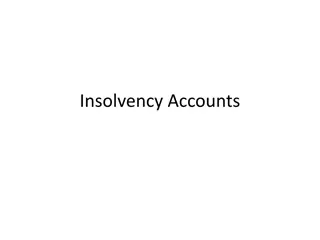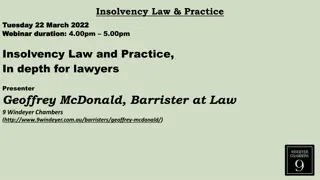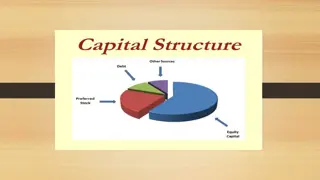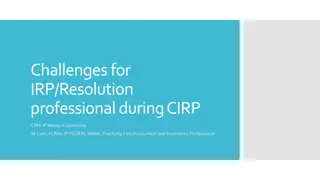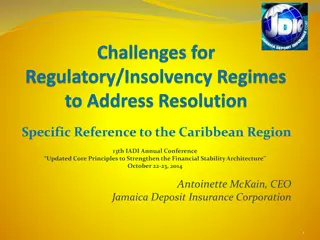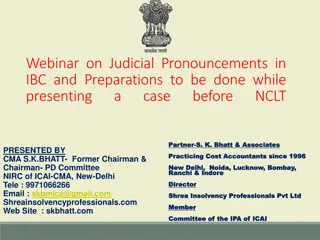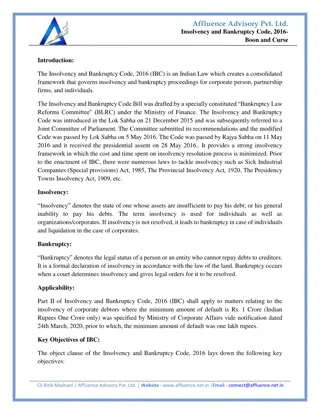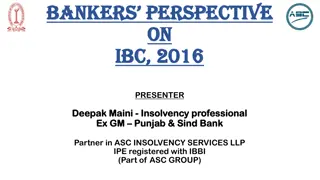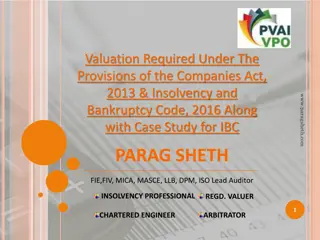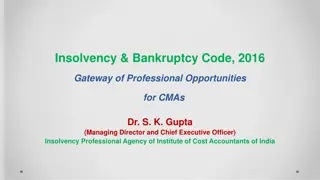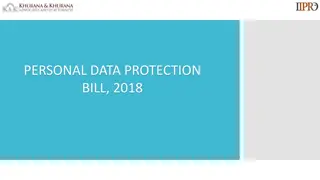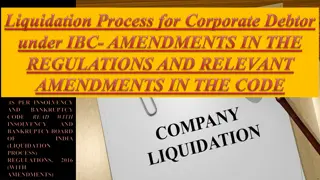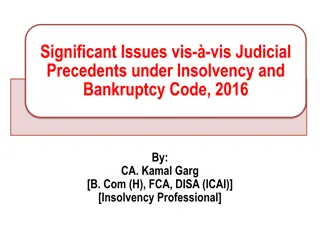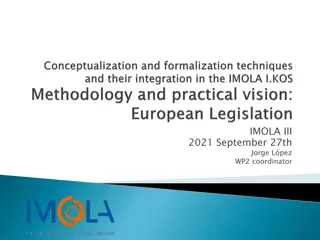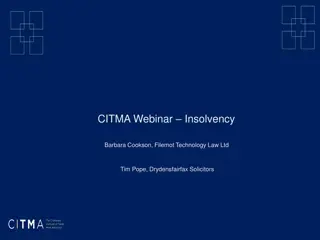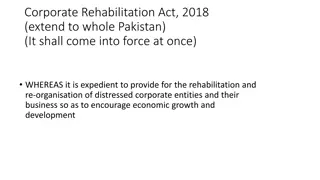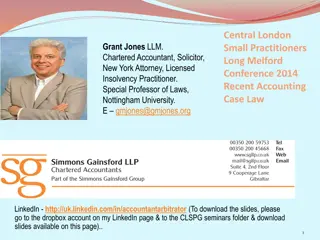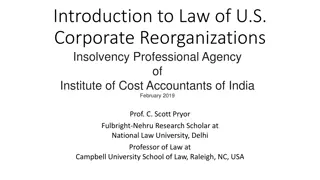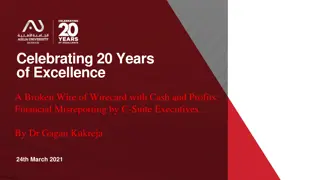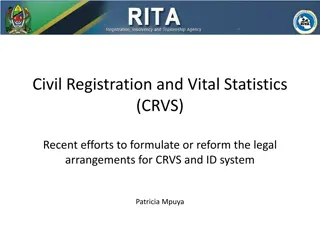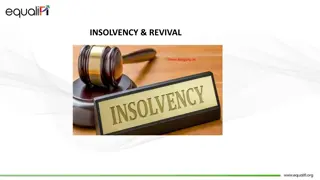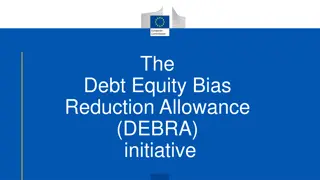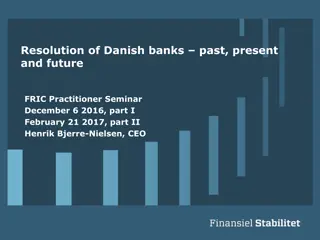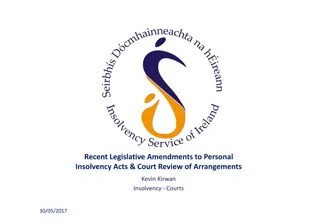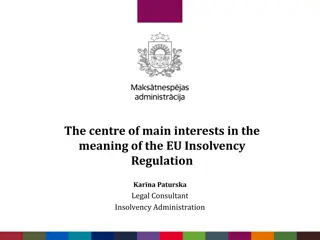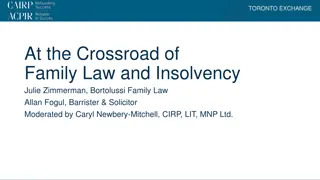Loans for Short-Term Cash Financial Assistance for Various Emergencies
Despite your bad credit history, you can always obtain cash support with short term cash loans. Many lenders are willing to give you the money without requiring credit verification. You therefore have bad credit factors, such as bankruptcy, insolvency, foreclosure, arrears, late payments, CCJs, and
3 views • 1 slides
Understanding Voluntary Surrender of Estate and its Benefits
Voluntary surrender of estate allows a natural person facing insolvency to apply for sequestration, providing legal protection against creditors. This process involves submitting an affidavit and court application, with applicants not required to appear in court. Different scenarios illustrate when
3 views • 12 slides
New Syllabus for CS Executive 2024: Understanding the Key Topics
\"The new Syllabus for CS Executive 2024 introduces key topics such as Corporate Governance, Competition Law, Insolvency, and Governance Ethics. These concepts aim to equip aspirants with a comprehensive understanding of corporate laws and practices, emphasizing the importance of ethical conduct, co
2 views • 7 slides
Understanding Insolvency Accounts and Laws in India
Insolvency accounts come into play when a debtor is unable to pay debts fully, leading to a legal process supervised by the government for debt resolution. Various scenarios constitute an act of insolvency, such as transferring property to defraud creditors or notifying them of debt payment suspensi
0 views • 38 slides
Liquidation of Companies: Procedures as per IBC 2016
The process of liquidating a company involves collecting and selling its assets to pay off debts, with remaining funds distributed to shareholders. Under the Insolvency and Bankruptcy Code (IBC) 2016, specific procedures must be followed, including initiation by either creditors or debtors within se
0 views • 16 slides
Insight into Insolvency Law & Practice: Webinar Overview
Delve into a comprehensive webinar on Insolvency Law and Practice featuring Geoffrey McDonald, a seasoned Barrister at Law. The session covers various aspects including Insolvency and Taxes, Statutory Demands, Winding-up Applications, Liquidations, Insolvent Trading, and more. Discover key statistic
0 views • 58 slides
Understanding Insolvency Accounts and Laws in Financial Accounting
Insolvency in financial accounting refers to the inability to pay debts when they fall due. This article covers the meaning of insolvency, the criteria for being declared insolvent, the Insolvency Act in India, and its applicability to individuals, firms, and Hindu Undivided Families. It distinguish
1 views • 10 slides
Rights of Unpaid Seller: Lien and Stoppage in Transit Explained
An unpaid seller of goods has specific rights, such as the right of lien to retain possession until full payment is received and the right of stoppage in transit to reclaim goods during transportation. These rights are crucial for sellers when dealing with non-payment or buyer insolvency scenarios.
0 views • 12 slides
Features of an Appropriate Capital Structure and Optimum Capital Structure
While developing a suitable capital structure, the financial manager aims to maximize the long-term market price of equity shares. An appropriate capital structure should focus on maximizing returns to shareholders, minimizing financial insolvency risk, maintaining flexibility, ensuring the company
3 views • 5 slides
Cross-Border Insolvency: Challenges and Solutions at Ritz-Carlton, Grand Cayman
Explore recent developments and potential reforms in cross-border insolvency at the event held at Ritz-Carlton, Grand Cayman. The program includes discussions on restructuring, obtaining documents abroad, a case study on cross-border insolvency, and more. Learn about practical problems facing direct
1 views • 36 slides
Challenges Faced by Insolvency Resolution Professionals during Corporate Insolvency Resolution Process
Insolvency Resolution Professionals encounter various challenges during the Corporate Insolvency Resolution Process, such as the need for prompt public announcements, appointing valuers, handling difficult transactions like preferential deals and related party transactions, assessing fraudulent acti
0 views • 8 slides
Financial Stability in the Caribbean: Challenges and Recommendations
The 13th IADI Annual Conference in the Caribbean focused on updating core principles to strengthen the financial stability architecture. Topics discussed included key elements for an effective resolution regime for banks, overview of the banking system in the region, bank resolution failures, and ch
0 views • 27 slides
Webinar on Judicial Pronouncements in IBC and NCLT Case Presentation
This webinar covers judicial pronouncements in Insolvency and Bankruptcy Code (IBC) cases and essential preparations for presenting a case before the National Company Law Tribunal (NCLT). It includes insights and case discussions regarding debt assignment, related party transactions, and disputes ov
0 views • 37 slides
Evolution of Company Secretaries as Key Governance Professionals
Company Secretaries (CS) have evolved into key governance professionals, providing valuable services in corporate governance, financial market services, and management services. Recognized as Key Managerial Personnel, CS play a crucial role in ensuring compliance with laws, corporate governance, and
0 views • 10 slides
Insolvency and Bankruptcy Code, 2016- Boon and Curse
The Insolvency and Bankruptcy Code (IBC) 2016 provides a unified framework for resolving insolvency in India, aiming to streamline processes, reduce resolution time, and protect creditors. While it enhances financial stability and transparency, chall
0 views • 4 slides
Challenges Faced by Banks in Adopting IBC
Banks face challenges in adopting the Insolvency and Bankruptcy Code (IBC) due to stringent provisioning norms, additional costs, and complexities in referring cases to the National Company Law Tribunal (NCLT). Secured NPA accounts older than 2 years, unsecured NPA accounts in the second year, and c
0 views • 20 slides
Overview of Valuation Requirements under Companies Act, 2013 & IBC 2016
This text provides insights into the valuation requirements stipulated by the Companies Act, 2013 and the Insolvency and Bankruptcy Code, 2016. It includes sections demanding valuation reports from registered valuers, such as for share capital issues, audit committee terms, director transactions, cr
0 views • 54 slides
Understanding the Insolvency and Bankruptcy Code of 2016 in India
The Insolvency and Bankruptcy Code of 2016 in India replaced various existing laws to streamline the process of corporate restructuring, insolvency, and liquidation. Enacted to resolve bad debts efficiently, attract investors, and strengthen the economy, the code offers benefits like quicker resolut
0 views • 31 slides
Overview of Personal Data Protection Bill, 2018
The Personal Data Protection Bill, 2018 addresses concerns regarding personal privacy amidst advancing technology. It grants rights to individuals and mandates transparency in handling personal information. The Bill stems from the recognition of the right to privacy as fundamental. It defines terms
0 views • 23 slides
Liquidation Process and Costs under Insolvency and Bankruptcy Code
The process of passing a liquidation order under the Insolvency and Bankruptcy Code is detailed, including scenarios for passing the order and the steps involved in the liquidation process. The costs associated with liquidation, as defined under Section 5 and Regulation 2(ea), cover various expenses
0 views • 28 slides
Key Judicial Precedents on Insolvency and Bankruptcy Code, 2016
Key judicial precedents under the Insolvency and Bankruptcy Code, 2016 are discussed, including rulings on insolvency pleas, distribution of profits during Corporate Insolvency Resolution Process (CIRP), obligations of unrelated parties, the 90-day period for filing claims, and the interaction of mo
1 views • 21 slides
European Legislation Key Concepts and Definitions in Land Registry Scope
European legislation provides definitions of key concepts for the land registry scope. Regulations and Directives focus on credit agreements, jurisdiction, succession, insolvency, matrimonial property regimes, and registered partnerships. These definitions are formal and abstract, aiming to encompas
0 views • 11 slides
Overview of Insolvency Procedures in Business and Individual Cases
Explore the different insolvency procedures such as bankruptcy, Individual Voluntary Arrangement (IVA), Company Voluntary Arrangement, Compulsory Liquidation, and Creditors Voluntary Liquidation. Understand the key aspects of each process, from initiating petitions to the appointment of IPs and the
0 views • 19 slides
VOLUNTARY WINDING UP
Exploring the distinctions between voluntary winding-up and compulsory winding-up in company law, focusing on the procedures involved in members' voluntary winding-up, declaration of solvency, and potential criminal sanctions for insolvent companies. The content delves into key aspects such as the a
0 views • 12 slides
Understanding Director Disqualification and Its Impacts
Directors can become disqualified through personal insolvency or involvement in an insolvent company. Disqualification orders can be imposed by the court under specific circumstances, making the individual unfit to be involved in managing a company. The Insolvency Service plays a key role in investi
2 views • 23 slides
Corporate Rehabilitation Act, 2018: A Comprehensive Overview
The Corporate Rehabilitation Act, 2018 aims to facilitate the recovery and restructuring of financially troubled corporate entities in Pakistan. It emphasizes the importance of revitalizing distressed businesses to foster economic growth and development. The Act defines key terms and outlines the ro
0 views • 21 slides
Recent Accounting Case Law: Oraki v. Bramston (2014)
Appeal against Deputy Master Julia Clark's decision on the application to strike out Particulars of Claim and amend it in the case of Oraki and another v. Bramston and another in 2014. The case involves negligence allegations against chartered accountants and licensed insolvency practitioners regard
1 views • 41 slides
Understanding US Corporate Reorganizations and Insolvency Law
Explore the key players in the US bankruptcy system, including bankruptcy judges, Debtors-in-Possession, and Creditors Committee in Chapter 11. Learn about basic bankruptcy concepts such as claims and priority, and the priority scheme outlined in the Bankruptcy Code. Gain insights into the legal obl
1 views • 13 slides
The Wirecard Scandal: Misreporting, Arrests, and Insolvency
Wirecard, a once prominent German technology company, faced a scandal involving financial misreporting, resulting in arrests of top executives and eventual insolvency. Allegations of money laundering surfaced in 2016, leading to investigations and whistleblower reports. In 2020, the company's inabil
0 views • 13 slides
Global Financial Safety Net Inequalities for Developing Countries
The article discusses the inequalities in the global financial safety net for developing countries and emerging markets, focusing on the challenges faced by countries with unsustainable debt. It explores initiatives like the Debt Service Suspension Initiative and the G20 Common Framework to address
0 views • 27 slides
Reform Efforts in Civil Registration and Vital Statistics System in Tanzania
The Registration Insolvency and Trusteeship Agency (RITA) in Tanzania is responsible for vital event registration, insolvency services, and trusteeship services. The history of birth registration in Tanzania dates back to the colonial era, with separate systems for Mainland Tanzania and Zanzibar. La
0 views • 9 slides
Understanding the Indian Bankruptcy and Insolvency Code (IBC) of 2016
The Indian Bankruptcy and Insolvency Code (IBC) of 2016 was introduced to streamline the resolution process for companies and individuals, aiming to improve recovery rates and ranking in insolvency matters. It consolidated existing laws, creating a time-bound framework to handle insolvency cases eff
0 views • 19 slides
Addressing the Debt-Equity Bias: DEBRA Initiative Overview
DEBRA initiative aims to mitigate the tax-induced debt-equity bias in corporate investment decisions, reducing risks of insolvency and fostering competitiveness. By neutralizing the bias, it seeks to create a harmonized tax environment, promoting equity-based investments and combating tax avoidance
0 views • 9 slides
Understanding Employment Contracts and Rights in Business
Exploring the different types of employment contracts, rights, and obligations for employees and employers. Topics include contract terms, hiring arrangements, express and implied terms, as well as details on wages, dismissals, and employer insolvency.
0 views • 87 slides
Understanding Primary and Secondary Functions of the Judiciary
The lecture discusses the primary functions of courts, which include the administration of justice through the application of rules and enforcement of rights. It also delves into secondary functions such as petition of rights, declaration of rights, and the administration of property in cases of ins
0 views • 8 slides
Understanding the Evolution of Danish Banks: Past, Present, and Future
Explore the fascinating journey of Danish banks through the past, present, and future at the FRIC Practitioner Seminar. Delve into topics such as insolvency regulation, bank resolution, investor roles, and the concentration of financial institutions in Denmark. Gain valuable insights into the essent
0 views • 30 slides
Recent Legislative Amendments to Personal Insolvency Acts & Court Review of Arrangements
The recent legislative amendments to the Personal Insolvency Acts introduced new provisions for court reviews of arrangement proposals, including changes to eligibility thresholds for Debt Relief Notices (DRNs) and increased regulation of Personal Insolvency Practitioners (PIPs). The Court Review un
0 views • 41 slides
Understanding the Centre of Main Interests in EU Insolvency Regulation
Centre of Main Interests (COMI) plays a crucial role in determining the jurisdiction for insolvency proceedings within the EU. This concept, defined by the Regulation 1346/2000, ensures that the debtor's administration of interests is ascertainable and objective, regardless of national legislation.
0 views • 9 slides
Understanding Family Law and Insolvency Intersection at CAIRP Exchange Toronto
Exploring the intersection of family law and insolvency, this presentation discusses common issues such as parenting matters, child and spousal support, division of property, and the definition of a spouse. It delves into the nuances of legal terminology, rights, and claims in cases involving bankru
0 views • 51 slides
My Personal Spacer – Live the Difference with Your Personal Space
Introducing My Personal Spacer, a unique invention designed to provide individuals with their personal space in a crowded world where diseases are prevalent. This innovative device enables users to maintain a comfortable distance from others without having to verbally express it. With the slogan "I
0 views • 9 slides



